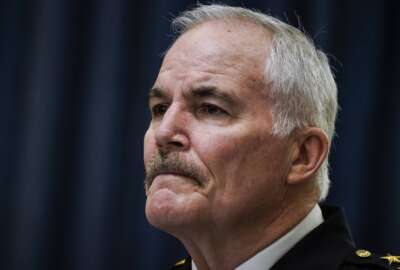USPS also finds itself in need of more truck drivers
In today's Federal Newscast, a national shortage of truck drivers hits home for the Postal Service.
To listen to the Federal Newscast on your phone or mobile device, subscribe in PodcastOne or Apple Podcasts. The best listening experience on desktop can be found using Chrome, Firefox or Safari.
- A national shortage of truck drivers hits home for the Postal Service. Its inspector general found the agency has been more than 1,000 drivers short since at least 2018. The IG office found USPS drivers are putting in more overtime hours to make up for the shortage. USPS is running a pilot program to train employees who already drive lighter-duty mail truck to drive larger tractor-trailers. More than 9,000 USPS employees work for its Postal Vehicle Service. The agency hires more than 1,700 contracted staff to drive longer highway routes.
- There were more problems for the Department of Veterans Affairs’ rollout of a new electronic health record system. The Spokane, Washington, hospital that’s served as a pilot site stopped admitting patients and rescheduled appointments for a full day late last week during an outage involving the new Cerner system. Administrators initially told clinicians they should assume all of the records in the new system were corrupted, according to an email obtained by the local newspaper, the Spokesman-Review. VA said the system was eventually restored, but about 200 patient records were affected.
- The Defense Department said it will close its biggest fueling site in the Pacific. Red Hill storage facility in Hawaii has provided a strategic fueling station for the United States since World War II. Now, after multiple leaks, spills and a community sickened by jet fuel in the water supply, the Pentagon said it is closing the site. The Defense Department will provide a plan for defueling the facility by the end of May. DoD said it will redistribute fuel to other areas and work with industry partners on finding new storage locations.
- The Air Force picked Project Arcwater as the winner of its 2022 Spark Tank competition. The contest asked airmen to develop innovative ideas that can better the service. The Arcwater system saves energy and provides drinking water by using solar fabric and environmental water harvesting. Airmen will be able to take the kit into the field to capture gallons of potable water.
- Two more agencies won $9 million under the Technology Modernization Fund. The Postal Regulatory Commission and the Selective Service System became the first small agencies to earn loans from the Technology Modernization Fund. The TMF Board announced PRC would receive $2.6 million to modernize its website, docket system and data analysis tools. The Selective Service received a loan of $5.9 million to modernize its registration, compliance and verification software. This is the second set of awards the TMF Board made using the $1 billion it received from the American Rescue Act Plan last summer.
- Federal contractors who provide software to agencies soon will have to confirm that they’re meeting minimum security requirements for an agency to use their product. But first the Office of Management and Budget wants to hear from vendors about what this self-attestation process should look like. OMB and NIST are holding a public virtual workshop on March 23 to obtain feedback from industry and other experts to inform future implementation guidance for federal procurement of secure software. NIST released the secure software guidance and development framework in early February.
- Director of National Intelligence Avril Haines announced Adele Merritt will be the intelligence community’s next CIO. Merritt has served in several positions throughout the IC over more than two decades. She started her career at the National Security Agency, and also served as deputy CIO for cyber at the Department of Energy. Merritt was on the National Security Council during the Obama administration. Most recently, she worked as program manager at DreamPort, a cybersecurity innovation nonprofit created by U.S. Cyber Command. (Federal News Network)
- Agencies have a new guide for securing their mobile environments. The Cybersecurity and Infrastructure Security Agency published guidance for “Applying Zero Trust Principles to Enterprise Mobility.” CISA said special consideration is needed for mobile devices given their widespread use and rapid changes in the technology. The guide comes as agencies look to achieve zero trust goals by the end of fiscal year 2024 as part of a new White House strategy. CISA is accepting comments on the new mobile security paper through April 18.
- The IRS, amid a challenging tax filing season, formally launches its Taxpayer Experience Office. The officially launched Taxpayer Experience Office has a roadmap for work the IRS should focus on over the next five years. Much of it informed by President Joe Biden’s executive order last year focused on improving customer service in government. Ken Corbin will lead the office, in addition to his role as the commissioner of the IRS’ Wage and Investment division. Congress mandated the IRS create this office as part of the Taxpayer First Act that Congress passed in 2019.
- The U.S. Capitol Police have made hundreds of improvements to address lessons learned from the January 6 attacks, but the department has a long way to go when it comes to morale and leadership issues. That’s one of the conclusions of a new wide-ranging assessment of the police force by the Government Accountability Office. GAO said its own survey largely mirrored the agency’s Federal Employee Viewpoint Survey results in recent years: only 50%-60% of employees said the Capitol Police was a good place to work, with many pointing to an absence of leadership.
Copyright © 2024 Federal News Network. All rights reserved. This website is not intended for users located within the European Economic Area.
Eric White
Eric White is news anchor and Federal Drive producer at Federal News Network.
Follow @FEDERALNEWSCAST
Related Stories
Related Topics
All News
Avril Haines
Capitol Police
Cybersecurity and Infrastructure Security Agency
electronic health records
Federal Drive
Federal Newscast
Government Accountability Office
Hiring/Retention
Inspector General
IRS
National & World Headlines
Office of Management and Budget
Office of the Director of National Intelligence
Red Hill
technology modernization fund
Tom Temin
Truck Drivers
U. S. Postal Service
Workforce






